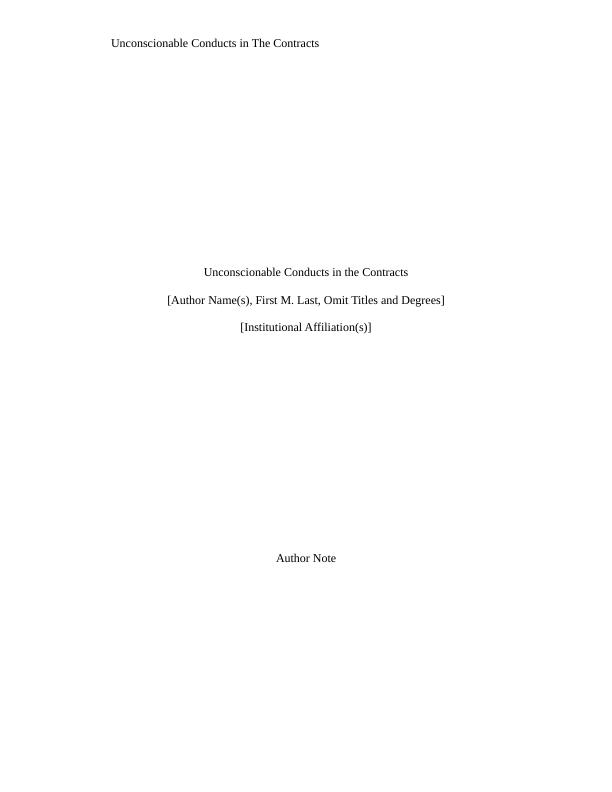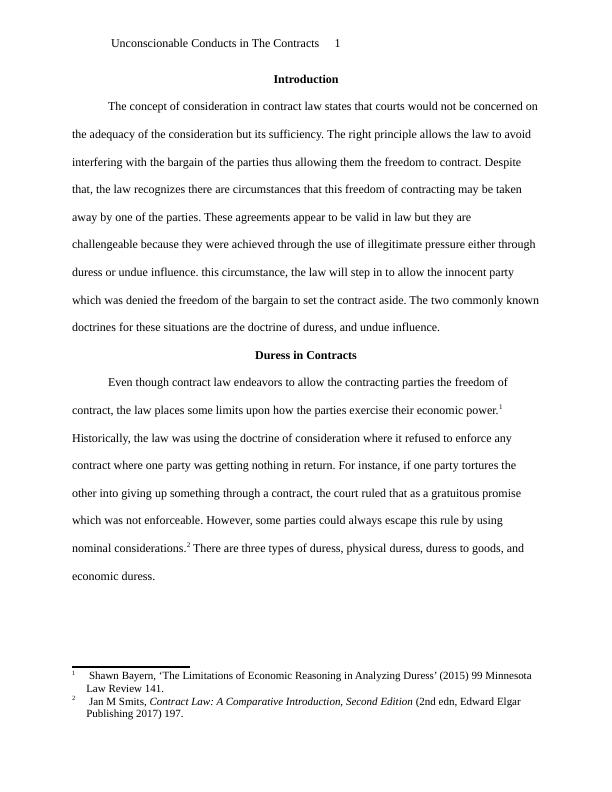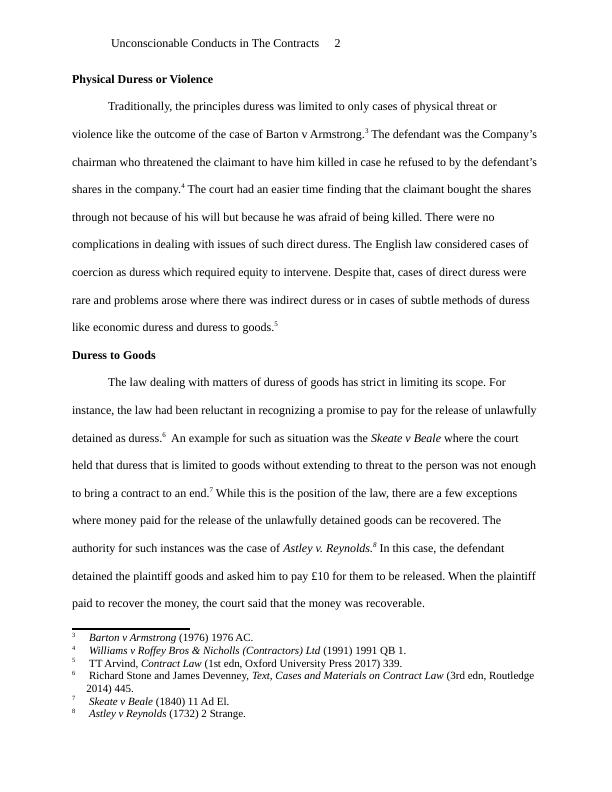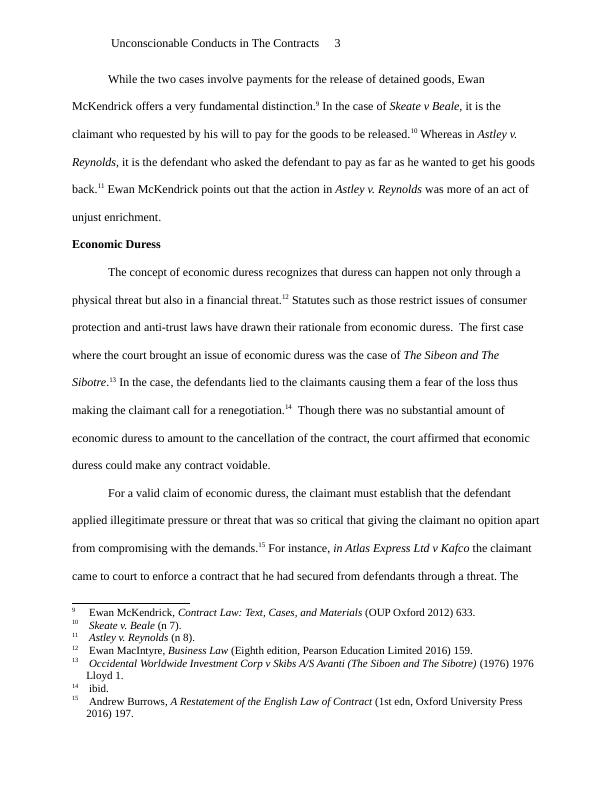Unconscionable Conducts in The Contracts
Added on 2023-01-13
12 Pages3463 Words53 Views
Unconscionable Conducts in The Contracts
Unconscionable Conducts in the Contracts
[Author Name(s), First M. Last, Omit Titles and Degrees]
[Institutional Affiliation(s)]
Author Note
Unconscionable Conducts in the Contracts
[Author Name(s), First M. Last, Omit Titles and Degrees]
[Institutional Affiliation(s)]
Author Note

Unconscionable Conducts in The Contracts 1
Introduction
The concept of consideration in contract law states that courts would not be concerned on
the adequacy of the consideration but its sufficiency. The right principle allows the law to avoid
interfering with the bargain of the parties thus allowing them the freedom to contract. Despite
that, the law recognizes there are circumstances that this freedom of contracting may be taken
away by one of the parties. These agreements appear to be valid in law but they are
challengeable because they were achieved through the use of illegitimate pressure either through
duress or undue influence. this circumstance, the law will step in to allow the innocent party
which was denied the freedom of the bargain to set the contract aside. The two commonly known
doctrines for these situations are the doctrine of duress, and undue influence.
Duress in Contracts
Even though contract law endeavors to allow the contracting parties the freedom of
contract, the law places some limits upon how the parties exercise their economic power.1
Historically, the law was using the doctrine of consideration where it refused to enforce any
contract where one party was getting nothing in return. For instance, if one party tortures the
other into giving up something through a contract, the court ruled that as a gratuitous promise
which was not enforceable. However, some parties could always escape this rule by using
nominal considerations.2 There are three types of duress, physical duress, duress to goods, and
economic duress.
1 Shawn Bayern, ‘The Limitations of Economic Reasoning in Analyzing Duress’ (2015) 99 Minnesota
Law Review 141.
2 Jan M Smits, Contract Law: A Comparative Introduction, Second Edition (2nd edn, Edward Elgar
Publishing 2017) 197.
Introduction
The concept of consideration in contract law states that courts would not be concerned on
the adequacy of the consideration but its sufficiency. The right principle allows the law to avoid
interfering with the bargain of the parties thus allowing them the freedom to contract. Despite
that, the law recognizes there are circumstances that this freedom of contracting may be taken
away by one of the parties. These agreements appear to be valid in law but they are
challengeable because they were achieved through the use of illegitimate pressure either through
duress or undue influence. this circumstance, the law will step in to allow the innocent party
which was denied the freedom of the bargain to set the contract aside. The two commonly known
doctrines for these situations are the doctrine of duress, and undue influence.
Duress in Contracts
Even though contract law endeavors to allow the contracting parties the freedom of
contract, the law places some limits upon how the parties exercise their economic power.1
Historically, the law was using the doctrine of consideration where it refused to enforce any
contract where one party was getting nothing in return. For instance, if one party tortures the
other into giving up something through a contract, the court ruled that as a gratuitous promise
which was not enforceable. However, some parties could always escape this rule by using
nominal considerations.2 There are three types of duress, physical duress, duress to goods, and
economic duress.
1 Shawn Bayern, ‘The Limitations of Economic Reasoning in Analyzing Duress’ (2015) 99 Minnesota
Law Review 141.
2 Jan M Smits, Contract Law: A Comparative Introduction, Second Edition (2nd edn, Edward Elgar
Publishing 2017) 197.

Unconscionable Conducts in The Contracts 2
Physical Duress or Violence
Traditionally, the principles duress was limited to only cases of physical threat or
violence like the outcome of the case of Barton v Armstrong.3 The defendant was the Company’s
chairman who threatened the claimant to have him killed in case he refused to by the defendant’s
shares in the company.4 The court had an easier time finding that the claimant bought the shares
through not because of his will but because he was afraid of being killed. There were no
complications in dealing with issues of such direct duress. The English law considered cases of
coercion as duress which required equity to intervene. Despite that, cases of direct duress were
rare and problems arose where there was indirect duress or in cases of subtle methods of duress
like economic duress and duress to goods.5
Duress to Goods
The law dealing with matters of duress of goods has strict in limiting its scope. For
instance, the law had been reluctant in recognizing a promise to pay for the release of unlawfully
detained as duress.6 An example for such as situation was the Skeate v Beale where the court
held that duress that is limited to goods without extending to threat to the person was not enough
to bring a contract to an end.7 While this is the position of the law, there are a few exceptions
where money paid for the release of the unlawfully detained goods can be recovered. The
authority for such instances was the case of Astley v. Reynolds.8 In this case, the defendant
detained the plaintiff goods and asked him to pay £10 for them to be released. When the plaintiff
paid to recover the money, the court said that the money was recoverable.
3 Barton v Armstrong (1976) 1976 AC.
4 Williams v Roffey Bros & Nicholls (Contractors) Ltd (1991) 1991 QB 1.
5 TT Arvind, Contract Law (1st edn, Oxford University Press 2017) 339.
6 Richard Stone and James Devenney, Text, Cases and Materials on Contract Law (3rd edn, Routledge
2014) 445.
7 Skeate v Beale (1840) 11 Ad El.
8 Astley v Reynolds (1732) 2 Strange.
Physical Duress or Violence
Traditionally, the principles duress was limited to only cases of physical threat or
violence like the outcome of the case of Barton v Armstrong.3 The defendant was the Company’s
chairman who threatened the claimant to have him killed in case he refused to by the defendant’s
shares in the company.4 The court had an easier time finding that the claimant bought the shares
through not because of his will but because he was afraid of being killed. There were no
complications in dealing with issues of such direct duress. The English law considered cases of
coercion as duress which required equity to intervene. Despite that, cases of direct duress were
rare and problems arose where there was indirect duress or in cases of subtle methods of duress
like economic duress and duress to goods.5
Duress to Goods
The law dealing with matters of duress of goods has strict in limiting its scope. For
instance, the law had been reluctant in recognizing a promise to pay for the release of unlawfully
detained as duress.6 An example for such as situation was the Skeate v Beale where the court
held that duress that is limited to goods without extending to threat to the person was not enough
to bring a contract to an end.7 While this is the position of the law, there are a few exceptions
where money paid for the release of the unlawfully detained goods can be recovered. The
authority for such instances was the case of Astley v. Reynolds.8 In this case, the defendant
detained the plaintiff goods and asked him to pay £10 for them to be released. When the plaintiff
paid to recover the money, the court said that the money was recoverable.
3 Barton v Armstrong (1976) 1976 AC.
4 Williams v Roffey Bros & Nicholls (Contractors) Ltd (1991) 1991 QB 1.
5 TT Arvind, Contract Law (1st edn, Oxford University Press 2017) 339.
6 Richard Stone and James Devenney, Text, Cases and Materials on Contract Law (3rd edn, Routledge
2014) 445.
7 Skeate v Beale (1840) 11 Ad El.
8 Astley v Reynolds (1732) 2 Strange.

Unconscionable Conducts in The Contracts 3
While the two cases involve payments for the release of detained goods, Ewan
McKendrick offers a very fundamental distinction.9 In the case of Skeate v Beale, it is the
claimant who requested by his will to pay for the goods to be released.10 Whereas in Astley v.
Reynolds, it is the defendant who asked the defendant to pay as far as he wanted to get his goods
back.11 Ewan McKendrick points out that the action in Astley v. Reynolds was more of an act of
unjust enrichment.
Economic Duress
The concept of economic duress recognizes that duress can happen not only through a
physical threat but also in a financial threat.12 Statutes such as those restrict issues of consumer
protection and anti-trust laws have drawn their rationale from economic duress. The first case
where the court brought an issue of economic duress was the case of The Sibeon and The
Sibotre.13 In the case, the defendants lied to the claimants causing them a fear of the loss thus
making the claimant call for a renegotiation.14 Though there was no substantial amount of
economic duress to amount to the cancellation of the contract, the court affirmed that economic
duress could make any contract voidable.
For a valid claim of economic duress, the claimant must establish that the defendant
applied illegitimate pressure or threat that was so critical that giving the claimant no opition apart
from compromising with the demands.15 For instance, in Atlas Express Ltd v Kafco the claimant
came to court to enforce a contract that he had secured from defendants through a threat. The
9 Ewan McKendrick, Contract Law: Text, Cases, and Materials (OUP Oxford 2012) 633.
10 Skeate v. Beale (n 7).
11 Astley v. Reynolds (n 8).
12 Ewan MacIntyre, Business Law (Eighth edition, Pearson Education Limited 2016) 159.
13 Occidental Worldwide Investment Corp v Skibs A/S Avanti (The Siboen and The Sibotre) (1976) 1976
Lloyd 1.
14 ibid.
15 Andrew Burrows, A Restatement of the English Law of Contract (1st edn, Oxford University Press
2016) 197.
While the two cases involve payments for the release of detained goods, Ewan
McKendrick offers a very fundamental distinction.9 In the case of Skeate v Beale, it is the
claimant who requested by his will to pay for the goods to be released.10 Whereas in Astley v.
Reynolds, it is the defendant who asked the defendant to pay as far as he wanted to get his goods
back.11 Ewan McKendrick points out that the action in Astley v. Reynolds was more of an act of
unjust enrichment.
Economic Duress
The concept of economic duress recognizes that duress can happen not only through a
physical threat but also in a financial threat.12 Statutes such as those restrict issues of consumer
protection and anti-trust laws have drawn their rationale from economic duress. The first case
where the court brought an issue of economic duress was the case of The Sibeon and The
Sibotre.13 In the case, the defendants lied to the claimants causing them a fear of the loss thus
making the claimant call for a renegotiation.14 Though there was no substantial amount of
economic duress to amount to the cancellation of the contract, the court affirmed that economic
duress could make any contract voidable.
For a valid claim of economic duress, the claimant must establish that the defendant
applied illegitimate pressure or threat that was so critical that giving the claimant no opition apart
from compromising with the demands.15 For instance, in Atlas Express Ltd v Kafco the claimant
came to court to enforce a contract that he had secured from defendants through a threat. The
9 Ewan McKendrick, Contract Law: Text, Cases, and Materials (OUP Oxford 2012) 633.
10 Skeate v. Beale (n 7).
11 Astley v. Reynolds (n 8).
12 Ewan MacIntyre, Business Law (Eighth edition, Pearson Education Limited 2016) 159.
13 Occidental Worldwide Investment Corp v Skibs A/S Avanti (The Siboen and The Sibotre) (1976) 1976
Lloyd 1.
14 ibid.
15 Andrew Burrows, A Restatement of the English Law of Contract (1st edn, Oxford University Press
2016) 197.

End of preview
Want to access all the pages? Upload your documents or become a member.
Related Documents
Unconscionable Conduct in Louth v Diprose (1992) - Business Lawlg...
|6
|977
|131
(pdf) General principles of contractlg...
|13
|3612
|82
Duress, Undue influence and Unconscionability of Contractslg...
|12
|3547
|92
Unconscionable Bargain: Principles and Legislationlg...
|13
|4141
|83
Business and Corporation Lawlg...
|9
|2609
|123
Can Susan avoid a contract under duress and undue influence?lg...
|8
|1582
|52
